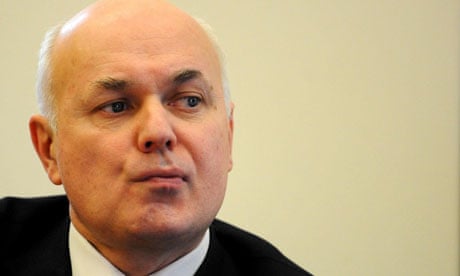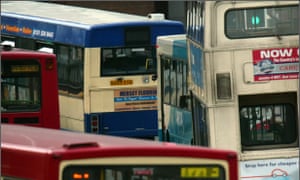
‘Talking to people using food banks and too often you hear people absorbing the blame. “I should have tried harder at school,” is a frequent refrain.’ Photograph: Murdo Macleod for the Guardian
Why don’t people rebel? The wonder of decades of rising inequality across the west is how placidly people put up with it. UK wages are still below 2008 levels, a growing sector of jobs are nasty – non-unionised, achingly hard, with workers treated worse, the boot on the employer’s foot despite low unemployment. You might call Brexit a kind of protest – but that can be overdone: the vote was swung largely by comfortable older Tory voters in the shires, led – or misled – by privileged ideologues.
Those on the progressive left have been perplexed that rising social injustice hasn’t led to much sign of the oppressed rising up, either in the ballot box or in protest. New research out on Wednesday from the London School of Economics suggests some explanations – though these will be of precious little comfort. Looking at surveys across the OECD’s 23 developed western countries since the 1980s, Dr Jonathan Mijs of the London School of Economics International Inequalities Institute monitors how, as countries become less equal, attitudes of the majority shift in the wrong direction.
Both rich and poor delude themselves they are ordinary
People come to believe more strongly that their country is a meritocracy where hard work and talent take people to the top. They are less likely to think structural inequalities or birth help or hinder people’s rise. The US, home of the American Dream – the myth that everyone has an equal chance to rise from log cabin to White House – is the most unequal, yet 95% now firmly believe in meritocracy, fewer in structural injustice. The UK, Australia and New Zealand are not far behind, sharing this Anglophone disease, a societal “body dysmorphia”: other European countries are less inclined to justify inequality, though the movement has been in that direction. This is the neoliberal triumph over hearts and minds.
The meritocracy myth comes with other tropes, especially placing the blame on the poor, with decreasing social empathy. Believing people sink through their own fault is the necessary adjunct for proving the mega-wealthy got there by merit alone.
In Britain, where inequality shot through the roof in the mid-80s and has stayed there ever since, we have seen how despising inequality’s losers has been deliberately fostered by governments. The Public and Commercial Services Union representing job centre staff, published a pamphlet this week outlining the decline in support for social security, and those who receive it. Remember the sheer spite of Peter Lilley, Tory social security secretary, in 1992 singing to his party conference a Mikado pastiche of a “little list” of people to be despised: “young ladies who get pregnant just to jump the housing queue” and “benefits offenders” making “bogus claims”. From then on the rightwing press and Benefits Street mockery set the tone of public contempt for anyone in need. Iain Duncan Smith used to send out juicy examples of benefit cheats to selected rightwing newspapers, without government figures showing fraud at just 1.1% of the benefits budget. In 2013, Ipsos Mori found that the public think £24 in every £100 is fraudulently claimed.
Politically, the mystery is why politicians got away with making things unfairer after the lid blew off top earning in the 80s. Now there’s less chance of owning a home, fewer savings, more debt and public services deteriorating. Cedric Brown, the first fat-cat shocker to catch the public eye, rewarded in 1995 for privatising British Gas with a salary of £475,000 (47 times that of his average employee), and a £600,000 incentive deal, comes from more innocent days. FTSE 100 CEOs now earn £4m.
Yet riots are extraordinarily rare – the French have always done it: it’s in their founding revolutionary DNA, and it helps to keep them less unequal than the Anglophones. Fear of revolution in cold war years kept unions strong and boardrooms wary of excess: the mid-70s, famed for union militancy, were the most equal years in British history.
This research suggests that as countries get more unequal people live in greater social isolation, locked within a narrow income group. Their friends and family share the same incomes, segregated by neighbourhood and marry similar partners. Children mix less in socially segregated schools. People no longer see over the high social fences so they don’t know how the other half lives, Mijs finds.
Ignorant of the facts, everyone wrongly places themselves on the income scale closer to the middle. Both rich and poor delude themselves they are ordinary. But telling people the facts doesn’t change their attitudes: increasingly they cling to a moral belief that people rise by merit, sinking for lack of it. Spend time talking to people using food banks or in Citizens Advice Bureaus knocked down by benefit sanctions, and too often you hear people absorbing the blame. “I should have tried harder at school,” is a frequent refrain, as if no other forces were at play. Talk to the mega-rich – I once conducted focus groups of earners up to £10m – and they are wilfully ignorant about their super-privilege, unshakable in believing their superior merit.
The right captured the story, the emotions, the moral framing: social democrats need to seize it back with a narrative of immorality that is more compelling. The British Social Attitudes survey suggests a swing back towards empathy with the swelling numbers of poor – more than £4m children. But still inheritance tax remains the most reviled of all taxes. The right forever try to prove the poor are stupider by nature than the rich, but Professor Steve Jones, celebrated geneticist, when asked about the heritability of intelligence, replies deftly that the most important heritable trait, by miles, is wealth.
Why don’t people rebel? The wonder of decades of rising inequality across the west is how placidly people put up with it. UK wages are still below 2008 levels, a growing sector of jobs are nasty – non-unionised, achingly hard, with workers treated worse, the boot on the employer’s foot despite low unemployment. You might call Brexit a kind of protest – but that can be overdone: the vote was swung largely by comfortable older Tory voters in the shires, led – or misled – by privileged ideologues.
Those on the progressive left have been perplexed that rising social injustice hasn’t led to much sign of the oppressed rising up, either in the ballot box or in protest. New research out on Wednesday from the London School of Economics suggests some explanations – though these will be of precious little comfort. Looking at surveys across the OECD’s 23 developed western countries since the 1980s, Dr Jonathan Mijs of the London School of Economics International Inequalities Institute monitors how, as countries become less equal, attitudes of the majority shift in the wrong direction.
Both rich and poor delude themselves they are ordinary
People come to believe more strongly that their country is a meritocracy where hard work and talent take people to the top. They are less likely to think structural inequalities or birth help or hinder people’s rise. The US, home of the American Dream – the myth that everyone has an equal chance to rise from log cabin to White House – is the most unequal, yet 95% now firmly believe in meritocracy, fewer in structural injustice. The UK, Australia and New Zealand are not far behind, sharing this Anglophone disease, a societal “body dysmorphia”: other European countries are less inclined to justify inequality, though the movement has been in that direction. This is the neoliberal triumph over hearts and minds.
The meritocracy myth comes with other tropes, especially placing the blame on the poor, with decreasing social empathy. Believing people sink through their own fault is the necessary adjunct for proving the mega-wealthy got there by merit alone.
In Britain, where inequality shot through the roof in the mid-80s and has stayed there ever since, we have seen how despising inequality’s losers has been deliberately fostered by governments. The Public and Commercial Services Union representing job centre staff, published a pamphlet this week outlining the decline in support for social security, and those who receive it. Remember the sheer spite of Peter Lilley, Tory social security secretary, in 1992 singing to his party conference a Mikado pastiche of a “little list” of people to be despised: “young ladies who get pregnant just to jump the housing queue” and “benefits offenders” making “bogus claims”. From then on the rightwing press and Benefits Street mockery set the tone of public contempt for anyone in need. Iain Duncan Smith used to send out juicy examples of benefit cheats to selected rightwing newspapers, without government figures showing fraud at just 1.1% of the benefits budget. In 2013, Ipsos Mori found that the public think £24 in every £100 is fraudulently claimed.
Politically, the mystery is why politicians got away with making things unfairer after the lid blew off top earning in the 80s. Now there’s less chance of owning a home, fewer savings, more debt and public services deteriorating. Cedric Brown, the first fat-cat shocker to catch the public eye, rewarded in 1995 for privatising British Gas with a salary of £475,000 (47 times that of his average employee), and a £600,000 incentive deal, comes from more innocent days. FTSE 100 CEOs now earn £4m.
Yet riots are extraordinarily rare – the French have always done it: it’s in their founding revolutionary DNA, and it helps to keep them less unequal than the Anglophones. Fear of revolution in cold war years kept unions strong and boardrooms wary of excess: the mid-70s, famed for union militancy, were the most equal years in British history.
This research suggests that as countries get more unequal people live in greater social isolation, locked within a narrow income group. Their friends and family share the same incomes, segregated by neighbourhood and marry similar partners. Children mix less in socially segregated schools. People no longer see over the high social fences so they don’t know how the other half lives, Mijs finds.
Ignorant of the facts, everyone wrongly places themselves on the income scale closer to the middle. Both rich and poor delude themselves they are ordinary. But telling people the facts doesn’t change their attitudes: increasingly they cling to a moral belief that people rise by merit, sinking for lack of it. Spend time talking to people using food banks or in Citizens Advice Bureaus knocked down by benefit sanctions, and too often you hear people absorbing the blame. “I should have tried harder at school,” is a frequent refrain, as if no other forces were at play. Talk to the mega-rich – I once conducted focus groups of earners up to £10m – and they are wilfully ignorant about their super-privilege, unshakable in believing their superior merit.
The right captured the story, the emotions, the moral framing: social democrats need to seize it back with a narrative of immorality that is more compelling. The British Social Attitudes survey suggests a swing back towards empathy with the swelling numbers of poor – more than £4m children. But still inheritance tax remains the most reviled of all taxes. The right forever try to prove the poor are stupider by nature than the rich, but Professor Steve Jones, celebrated geneticist, when asked about the heritability of intelligence, replies deftly that the most important heritable trait, by miles, is wealth.










